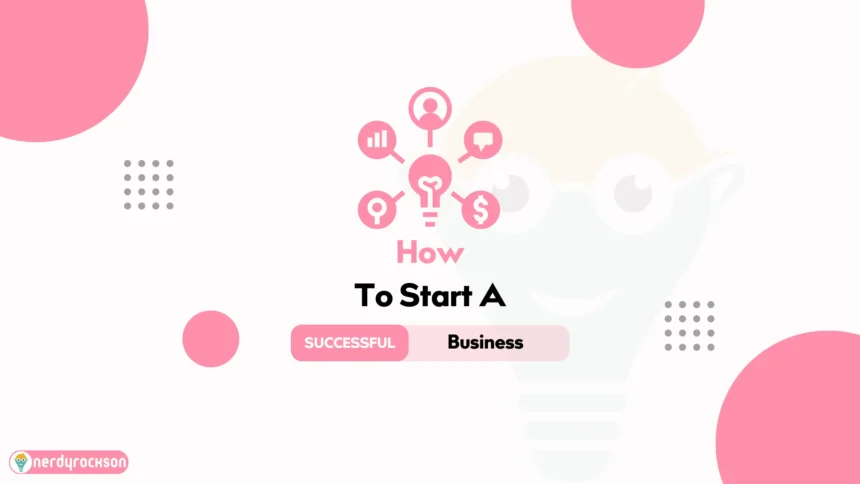Are you eager to plunge into the thrilling world of entrepreneurship and learn how to start a successful business in 2024? Exploring effective strategies and keeping abreast of emerging trends can contribute significantly to the success of your enterprise. When it comes to business, success stems from the ability to foresee the future and adapt to the prevailing circumstances. Entrepreneurship, though filled with potential challenges, offers immense rewards, including financial independence and the chance to bring your imaginative ideas to life. By understanding the appropriate steps, you open up a world of opportunities.
A recent study suggests that over 627,000 new businesses are launched in the United States each year [1]. That’s a vast pool of ambitious entrepreneurs: people driven by innovative ideas and the desire to create meaningful change. Yet only about half of these businesses survive the first five years[1]. Thus, the keyword here is how to start a successful business. Whether operating in a volatile economy or facing stiff competition, successful entrepreneurship requires robust strategies and actionable plans.
Entrepreneurship is not just about starting a business. It’s about identifying a problem, developing an innovative solution, and creating value for your customers and yourself.
- In the pursuit of success, it is crucial to understand the business landscape, identify a viable business idea, and conduct thorough market research.
- Creating a practical business plan helps chart the future course of your enterprise while considering legal aspects, which is essential to protect the integrity of your business.
- Securing adequate funding, building a competent team, maintaining excellent customer relations, and being receptive to change are further strategic elements toward building sustainable success.
So, if you’re ready to embark on this exhilarating journey of starting a successful business in 2024, let’s dive into the intricacies of this comprehensive guide.
How to Start a Successful Business
When you decide you’re ready to dive into the world of entrepreneurship, the first thing you’ll notice is just how vast it is. As you embark on this journey, it’s important to remember that you’re not alone. Remember, you’re building a dream, not just a business. If it’s done right, the process of building that dream can be as rewarding as the final result. So, let’s dive in and explore how to start a successful business in 2024.
1. Understanding the Business Landscape in 2024
In today’s dynamic and rapidly evolving business environment, technology holds a key position. It influences not only how businesses operate but also how they communicate with their target audience, provide solutions, and create value. Breakthroughs in areas such as artificial intelligence, big data, blockchain technology and online commerce have transformed business models and customer expectations.
An understanding of the economy is equally important when venturing into business in 2024 [2]. Variables such as inflation rates, fiscal policies, and the global economic landscape can greatly impact the success of your start-up. It is crucial to be aware of both local and international economic trends and how they could potentially affect your plans.
Furthermore, societal trends also significantly shape the business environment. From increasing awareness around sustainability and ethical practices to the shifting habits of consumers in a more digital world, these factors can drive demand and shape the type of products and services businesses are offering.
Staying updated with these trends and changes isn’t just beneficial—it’s pivotal to the success of any new business. By understanding the current climate, you can seize growth opportunities, mitigate risks, and navigate through challenges effectively. Continually adapting your business to be relevant to the ever-changing world aids greatly in achieving success. Remember, a successful business is one that encompasses technology, economics, and societal observations in its core operations.
2. Identifying a Business Idea
Having a brilliant business idea is the first critical step on the path of starting a successful business. You might be wondering, “How do I come up with a viable business idea?” Well, it’s simpler than it may seem. Typically, it involves identifying a need, finding what you’re passionate about, and considering your skills and experience.
Identifying a Need: One proven method of generating a viable business idea is by identifying unmet needs within your community or industry. This can be achieved by keeping a keen eye on trends, talking to potential customers, and even reassessing existing products or services to find out how they can be improved.
Finding Your Passion: While addressing a need is critical, it’s equally important to consider what you’re passionate about. Businesses grounded in passion tend to be more sustainable because it’s your deeply ingrained interest that motivates you through challenges.
Considering Skills and Experience: Lastly, remember to take into account your own skills and experience. A successful business venture often requires a deep understanding of the product or service being provided. Utilizing your skills and past experiences can give you a unique advantage in the marketplace.
In conclusion, these three key factors combine to form a foundation from which a thriving, successful business can be built. Be sure to take each into account as you brainstorm your next big business idea!
3. Market Research
Plunging headfirst into business without first understanding your market could be tantamount to jumping off a cliff blindfolded. It’s vital to conduct comprehensive market research to comprehend who your target audience is, and what your competition looks like and to stay abreast of market trends.
The importance of market research lies in the fact that it can offer invaluable insights about your consumers. By gaining a clear understanding of who they are and what their behaviours and preferences are, you could develop goods or services that cater specifically to their needs. Moreover, identifying your competitors and understanding their strategies can assist you in carving out a unique niche and standing out in the market.[3]
Furthermore, being aware of market trends and shifts could provide the foresight needed to adapt and evolve, strengthening your business’s longevity. Constant change is a given in the business landscape, and staying in sync with these trends could place you leagues, ahead of your competition.
Now, let’s discuss a few strategies that can make your market research more effective:
- Surveys: These are excellent for collecting specific data directly from your potential customers. With online tools, you can design and distribute surveys quickly and affordably.
- Focus Groups/Interviews: Convening small groups of people that fit your target audience or conducting in-depth interviews can provide richer, qualitative data.
- Public Data/Reports: These can reveal broader market trends and industry statistics. Look out for industry reports, census data, and other relevant publications.
- Social Media: Platforms such as Facebook, Instagram and Twitter offer insightful analytics to understand your audience’s demographic and online behaviour.
Remember, consistency is key. Market trends, audience preferences, and competition are all dynamic; thus, market research should not be a one-off event but an ongoing process to keep you informed and your business successful.
4. Creating a Business Plan
In the grand scheme of commencing a successful business, one cannot overemphasise the importance of a well-structured business plan[4]. Consider it as a roadmap, guiding you towards your selected destination – in this case, your business success for 2024. Without a properly constructed plan, you might find your venture straying off course, meandering through unnecessary delays and setbacks.
The first section is usually the Executive Summary. Typically, it’s a condensed, bite-sized version of what your business plan entails. It should be engaging enough to captivate potential investors, kick-starting their interest in your venture.
A comprehensive Company Description follows the Executive Summary. It outlines what your business does, the market needs it meets, and how it will serve its target customers. This section paints a vivid picture of your operational anatomy, drawing potential investors into your business’s core.
The next part should be a diligent Market Analysis. This entails a close examination of your industry, competitors, and the potential clientele you aim to engage. It checks your business idea against the reality of the market, giving you a snapshot of where you stand and how you can position yourself for maximum benefit.
Your Business Plan should also address Organisation and Management. It should make clear the hierarchical structure, roles and responsibilities of your team. It’s where you demonstrate your business will run like a well-oiled machine, with every part contributing to the whole.
The spotlight then turns towards the Service or Product Line section, where you describe what you’re selling or offering. This part should highlight the benefits of your product or service from the client’s perspective. Going beyond just specification, explain why your product or service is unique or how it fills a gap in the market.
In the Marketing and Sales section, explain your strategy for attracting and retaining customers. Go into detail on how you plan to reach your target market and how you’ll persuade them to engage with your product or service.
Now, the most intriguing part for your potential investors is the Financial Projections section. This gives a preview of the profitability of your venture. It includes sales and income forecasts, balance sheets, and cash flow statements. This section should make convincing arguments about your business’s profitability potential.
An efficiently crafted business plan is a potent tool, capable of not only guiding your business activities but also securing the much-needed buy-in from potential investors. It exists at the heart of how to start a successful business in 2024.
5. Legal Considerations
Starting a successful business in 2024 doesn’t just pertain to spotting a gap in the market or developing a ground-breaking product. It also involves navigating a maze of legal requirements that could be rather puzzling, particularly for first-time entrepreneurs. Let’s break down these legal aspects.
Registering the Business: The first legal step in your entrepreneurial journey is registering your business. It establishes your company as a legal entity, providing personal liability protection, potential tax benefits and an increased credibility to your venture. The registration process varies based on your location and the nature of your business, so it’s advisable to seek local guidance or utilise online tools.
Obtaining Licences and Permits: Depending on your industry, you might need specific licenses or permits to operate. These could range from health permits for restaurants to professional licenses for certain consultancy services or even zoning permits if you’re planning to operate from a physical location. Failing to obtain these could lead to fines, legal action, or even a complete shutdown, so do ample research and ensure all necessary permissions are in place.
Understanding Tax Obligations: Tax is often considered a complex topic, but one that business owners cannot afford to neglect. Your tax obligations will depend on the legal structure of your business, where it’s located, and the nature of your operations. From income tax to sales tax and from employer obligations to GST, understanding and fulfilling your tax obligations are critical components of running a successful business in 2024. Getting guidance from a tax consultant or CPA can be invaluable in this aspect.
By taking these legal considerations into account, you’re not just complying with the law but also bulletproofing your business from potential legal complications that could hamper your success.
6. Securing Funding
Confirming a reliable source of financing is a major step in the journey of how to start a successful business in 2024. Various options are at your disposal, including business loans, investors, crowdfunding, or even bootstrapping. The method you choose has its ups and downs, and a lot will depend on the nature of your intended venture.
Business Loans: Business loans from banks are a traditional route of funding. It’s tried and tested, with the potential to provide large capital if your business plan is compelling. However, bear in mind these loans come with a caveat – interest rates. Timely payments are necessary to avoid piling Debt.
Investors: Securing funds from investors, such as angel investors and venture capitalists, can be hugely beneficial not just for financial support but for their business acumen and valuable network. On the flip side, investors do expect returns and a part of your business ownership might have to be compromised.
Crowdfunding: Crowdfunding platforms like Kickstarter and GoFundMe have emerged as popular choices in recent times. It moves beyond the traditional banking system, opening your business idea to a wider audience. But remember, it requires meticulous planning and strong marketing strategies to make your idea stand out in the crowd.
Bootstrapping: There’s also bootstrapping, which means funding your own venture from personal savings or revenue from another business. This method maintains control over your business, with no interests or investors to worry about. However, it limits your expansion and growth if you don’t have substantial reserves.
Selection among these options can feel daunting. Tips to secure funding successfully include thorough research on each, a polished business plan, a realistic budget, and optimum usage of personal connections. Remember, agility and flexibility can be of great advantage during this process.


7. Building a Strong Team
A robust team can be the very foundation upon which your business success is built. Understanding how to start a successful business can hinge on the character and competency of your team. So, how do we build an effective and cohesive team?
Firstly, hiring the right people is key. This entails hiring not just for skills but, more crucially, hiring for attitude. You’ll need individuals who are adaptable, willing to learn and aligned with the vision of your business. Conduct thorough interviews, do some background checks, and don’t hesitate to hold trial periods for potential employees. Remember, skills can be taught, but compatibility and the right mindset are more inherent attributes.
Tip: Utilise services like LinkedIn or Indeed to find potential candidates. Additionally, consider using professional recruitment companies to relieve some of the pressure and ensure you’re presented with the best possible selections.
Creating a positive work culture is another significant element. This involves setting shared goals, promoting open communication, and encouraging collaborative problem-solving. Your employees should feel safe to voice their opinions, propose ideas, or even express concerns. Such an environment can spark innovation, enhance productivity, and ultimately boost overall business performance.
Finally, effective leadership can often be a determining factor in your business’s success. A good leader celebrates team achievements, provides constructive feedback, and empowers team members. Focus on honing your leadership skills by attending seminars or training, reading up on leadership strategies, or even seeking a mentor. A good leader is often the linchpin holding the team together and ensuring harmonious collaboration.
Building a strong team for your business doesn’t just happen overnight. It requires intentional, consistent effort and the right strategies. But, the payoff – a committed, capable team driving your business towards success – is undoubtedly worth it.
8. Marketing and Branding
Effective marketing and branding are the heart and soul of any enterprise when it comes to knowing how to start a successful business. Quite simply, they spur the lifeblood of your business – customers. They help distinguish you from the competition while creating an inviting and memorable identity, drawing customers in.
A solid branding strategy can lay the foundation for establishing trust and showcasing your business’s key values. Elements, including your logo, tagline, colour scheme, and tone of voice, all play crucial roles in developing a strong brand image, one that resonates with your target audience and turns them into repeat buyers. But remember, branding isn’t a one-time event; instead, it requires constant nurturing and adapting, especially in response to market trends.
If we turn our attention to marketing strategies, our focus should be on ensuring your products or services reach potential customers efficiently and effectively. The options are many, from digital marketing tactics to more traditional routes.
Digital Marketing: In 2024, digital marketing has become non-negotiable. Make sure to define an SEO strategy to improve your website’s visibility[5] on search engines. Google Ads can also be a worthwhile investment, enabling you to reach a larger audience. But, most importantly, never underestimate the power of content marketing. An exciting, informative blog or a series of engaging webinars can be your ticket to attracting new customers, retaining existing ones, and showcasing your expertise.
Social Media Marketing: It’s no secret that social media is a major player in the marketing world. Platforms like Instagram, Facebook, and LinkedIn offer access to billions of prospective customers. Running targeted ad campaigns, engaging with your audience, and posting relevant content regularly can significantly enhance your market visibility and customer engagement.
Traditional Marketing: Despite the rise of the digital world, traditional marketing methods like direct mail campaigns, networking events, and print media can still pack a punch, mainly if you’re targeting a local or less tech-savvy audience. These methods provide a more personal touch and can lead to strong relationships with your customers.
To create a successful marketing and branding strategy, the key lies in understanding your target audience, crafting a unique brand voice, and carefully selecting marketing channels that best reach your customers. Dive in, experiment, and remember, there’s always room for tweaking and improvement.
9. Customer Service and Retention
Undeniably, customer service and retention are pivotal to the success of your burgeoning business. In today’s era, when the market offers a plethora of choices to customers, the way you treat your customers can set your business apart. It’s not just about getting customers; it’s about keeping them happy and loyal. When customers consistently receive excellent service, they’re more likely to return, providing your business with a stable revenue stream[6].
Let’s delve into some strategies on how to provide top-notch customer service and retain those valuable clients:
Establish a customer-focused culture: Encourage each team member to put the customer first. This means adopting a mentality that values customers, listens to their feedback, and resolves their issues promptly.
Invest in training: Equip your team with the necessary customer service skills. This could include empathetic communication, problem-solving skills, and product knowledge, amongst others. Regular training ensures your team stays updated and effective.
Offer consistent interactions: Customers value consistency. Offering consistently positive experiences not only pleases your customers but also builds trust, which encourages customer loyalty.
Implement customer loyalty programmes: Loyalty programmes are an effective customer retention strategy. Offer customers exclusive deals, perks, or rewards as a token of your appreciation for their loyalty. It promotes a sense of belonging and keeps customers coming back for more.
In summary, successful businesses in 2024 will not only focus on acquiring new customers but also dedicate resources to providing exceptional customer service and implementing effective retention strategies.
10. Adapting and Evolving
As you venture into the business world with a mindset of success, remember that the only constant is change. Today’s rapidly shifting marketplace requires businesses to be nimble, adaptable and open to evolution. To truly flourish is not just about starting your business successfully; it’s about maintaining that success in the long term.
Embracing flexibility enables you to navigate unpredicted twists and turns that could re-route your business journey. In 2024, as new technologies unravel, societal trends shift and customer preferences evolve, the ability to adapt becomes ever more critical. Don’t fear changes, but rather, proactively fine-tune your business processes, offerings and strategies in response to these changes. Adapting isn’t only about survival; it’s an opportunity to be more innovative, improve your business, and stay ahead of the competition.
The commitment to continuous learning lays the foundation for adaptability. It’s critical to stay abreast of industry developments, technological advancements, and market trends. This allows you to make calculated decisions that propel your business forward. Thus, make learning an integral part of your business culture. Encourage your team to seek knowledge and hold regular training sessions to inform them of new discoveries or strategies relevant to your business.
Furthermore, embrace feedback, as it serves as a tool for growth and improvement. Listen attentively to what your customers, employees, and even competitors are saying. Their insights can direct you towards areas that need adjustments or highlight parts of your business that are thriving. It can be tempting to take negative comments personally, but in the business world, feedback, be it positive or negative, is invaluable.
Through continuous learning and being responsive to feedback, you’ll position yourself to make necessary changes that align your business with its growth trajectory. Remember, the process of learning, feedback and adaptation should be cyclical: learn, adapt, receive feedback, learn some more, and continue to adapt. It’s the rhythm that helps keep businesses thriving whilst retaining relevance in the fast-paced business world of 2024.
Conclusion
In conclusion, starting a successful business in 2024 is quite achievable when you’re fortified with the right knowledge and insights provided in this article. Keep in mind the importance of understanding the business landscape, identifying a unique business idea, and conducting thorough market research.
Remember not to underestimate the power of a well-drafted business plan, understand the legal considerations, and secure the appropriate funding. As you kick start your journey, never forget the essential role of assembling a strong team. Your team’s collective skills are crucial to your business’s growth and success.
Moreover, paying due attention to marketing and branding efforts, as well as establishing a customer-focused culture and consistent interaction, ensures you’re continuously offering value to your customers. Do invest in training and implement customer loyalty programmes; they have a positive impact on customer retention.
Finally, the ability to adapt and evolve in the face of challenges and changing market dynamics can distinguish a successful business from the rest. Now that you’re equipped with this information, the next step is to take action. The journey of a thousand miles begins with a first step. Believe in your idea and take the leap towards starting your successful business in 2024. Remember, success is a journey, not a destination. So, start your journey today!
Reference
[1] ^ U.S. Bureau of Labor Statistics
[2] ^ Statista: E-commerce as percentage of total retail sales worldwide
[3] ^ Investopedia: How to Do Market Research, Types, and Example
[4] ^ Investopedia: Business Plan: What It Is, What’s Included, and How to Write One
[5] ^ WebFX: Website Statistics: 60+ Website Stats to Know
[6] ^ Tech.co: 51 CRM Statistics 2023









